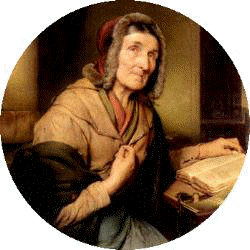
To Be Caught Was To Die!
This story comes from a northern mountain valley of Italy several hundred years ago. During what is sometimes referred to as the "dark ages," the Bible was outlawed because it was thought to be dangerous for common people to read. It was easier to maintain control of people if they did not have access to information.
People risked their lives, and often sacrificed their lives,
in order to obtain copies of the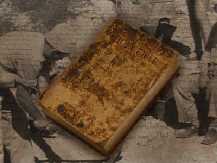 Scriptures. Today's story is somewhat typical
of the fear that people experienced during those years of persecution and
darkness. Today the Bible is freely sold -- most people have at least one copy.
But though the Bible may be displayed upon the coffee table or on the book
shelf. it has not found its way into our minds. It is seldom studied. People no
longer know what it says. Millions of people sacrificed their lives that we
might have the Scriptures today, yet it is not appreciated! Television has
replaced the Scriptures as the object of worship and attention.
Scriptures. Today's story is somewhat typical
of the fear that people experienced during those years of persecution and
darkness. Today the Bible is freely sold -- most people have at least one copy.
But though the Bible may be displayed upon the coffee table or on the book
shelf. it has not found its way into our minds. It is seldom studied. People no
longer know what it says. Millions of people sacrificed their lives that we
might have the Scriptures today, yet it is not appreciated! Television has
replaced the Scriptures as the object of worship and attention.
"Worship?" you ask. "Who worships television?"
Well, no, we do not bow down and pray to it. But we do sacrifice to it most of our leisure time, and it is the greatest influence affecting most people's outlook and beliefs, not the Bible.
Isn't it time to spend more time with the Bible and less with the other things of life? My prayer is that today's story might impress you with the sacrifice that millions of people have made, in ages past, in order to read the Bible:
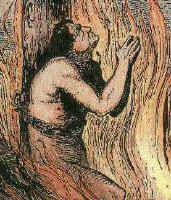
It was an old scene. Katrina thought back to the first time she had smelled the stench of burning flesh and saw the dying forms suspended between heaven and earth upon what was called a "stake." She had been but a girl then. It was the way of life. It was a horrible way of life, with no release. As far as she was concerned, it had always existed, and always would. And now again, the flames were ascending -- this time upon a friend who had been "caught!"
From the 6th century on into the 18th century, Europe suffered the torments of totalitarian religious rule. It is estimated that 50- 150 MILLION people were martyred by being burned at the stake, pulled apart by torture racks, encased in dungeons, or by some other method of torment.
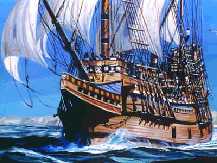 That's
why people fled to America in the early days. They wanted a country where people
could worship as their conscience dictated. Religious freedom is one of the
teachings of the Bible.
That's
why people fled to America in the early days. They wanted a country where people
could worship as their conscience dictated. Religious freedom is one of the
teachings of the Bible.
It was Jesus, Stephen, Paul, and the disciples who were martyred in the first century. It was the bigoted religious leaders and Pagan Roman rulers who martyred them. But during the middle ages, the power swung from the Pagan Romans to the Christians.
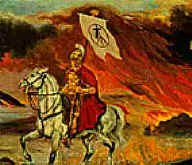 That should have been good. But somehow, once Christianity
became popular, it became degraded. Constantine, in 325 A.D., professed to be
converted to Christianity. He wanted his whole army to be the same religion that
he was, so he marched them through a river and declared them all Christians. Of
course, they still worshipped their images. They still kept their Pagan holidays
(now with Christian names). And the Romans did one other thing they believed
that they should control the consciences of everyone else. When they were
Pagans, they tried to force everyone to be Pagans. When they were Christians,
they tried to force everyone to be their kind of Christians.
That should have been good. But somehow, once Christianity
became popular, it became degraded. Constantine, in 325 A.D., professed to be
converted to Christianity. He wanted his whole army to be the same religion that
he was, so he marched them through a river and declared them all Christians. Of
course, they still worshipped their images. They still kept their Pagan holidays
(now with Christian names). And the Romans did one other thing they believed
that they should control the consciences of everyone else. When they were
Pagans, they tried to force everyone to be Pagans. When they were Christians,
they tried to force everyone to be their kind of Christians.
And so Pagan intolerance permeated Christianity during the
middle ages. But there was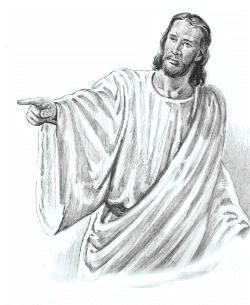 one trouble with this -- the Bible, upon which
Christianity was supposed to be built, condemns religious intolerance. Jesus
said, "If you love me, keep my commandments" (John
14:15). "You know that the Gentiles lord it over them.... Yet it shall not
be so among you... 'just as the Son of Man did not come to be served, but to
serve, and to give His life a ransom for many" (Matthew 20:25-28).
one trouble with this -- the Bible, upon which
Christianity was supposed to be built, condemns religious intolerance. Jesus
said, "If you love me, keep my commandments" (John
14:15). "You know that the Gentiles lord it over them.... Yet it shall not
be so among you... 'just as the Son of Man did not come to be served, but to
serve, and to give His life a ransom for many" (Matthew 20:25-28).
One time two of Jesus' disciples wanted Jesus to send fire down from heaven to destroy those who didn't accept them. Jesus strongly rebuked them, and said, "The Son of man did not come to destroy men's lives but to save them" (Luke 9:56). This was Jesus' example.
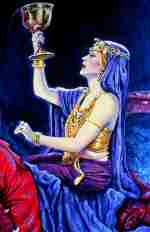 A religion that kills others who do not
recognize their dogmas is called a "Beast" religion, or a
"Harlot" religion, in Revelation. This was the name it gave the woman
(i.e. church) that was "drunk with the blood of the saints and with the
blood of the martyrs of Jesus" (Revelation 17:6).
A religion that kills others who do not
recognize their dogmas is called a "Beast" religion, or a
"Harlot" religion, in Revelation. This was the name it gave the woman
(i.e. church) that was "drunk with the blood of the saints and with the
blood of the martyrs of Jesus" (Revelation 17:6).
Thus there was a problem. The Christian religion in power
during the dark ages was opposed to religious freedom. But the Bible champions
religious freedom and condemns religious persecution. So what should they do?
The answer is fairly simple in a totalitarian environment -- just outlaw the
Bible! Declare that only a very few religious superiors can understand it! And
that is exactly what was done during the middle ages.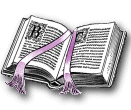
Not only was the Bible outlawed, it became a death penalty to own or even read it! At times, it was worthy of death just to know of someone who had a Bible if you didn't turn him or her in! And so Katrina was watching her friend burning upon a stake. She was suspended above the ground with her hands tied together around the stake in back of her, and with a pile of wood kindled beneath her. It was a horrible method of execution. Her friend's crime? She had been "caught" with a Bible. To be caught was to die!
It was agony just to watch as the flames arose. Her clothes
were burning, her eyebrows were gone, her neck, lips and ears were swollen, her
golden hair was a flaming torch, the black smoke was ascending upward.
Brainwashed adherents of the state religion stood by jeering. She was not the
only victim burning upon this day. Her husband was silhouetted upon another
stake nearby -- the smoke from their two separate fires seemed to touched each
other and mingle into one as they curled their way upward toward heaven. A
fitting symbol, Katrina thought. Their children were nearby too, crying but
being restrained by the officials. They would be placed in another home. Katrina
hoped 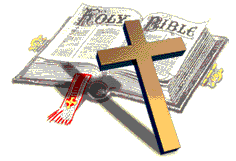 they would remain faithful to what they had been taught.
they would remain faithful to what they had been taught.
"Why doesn't she cry, or yell, or scream?" Katrina thought. How can she stand it? Was God giving her extra Power? Like Stephen in Acts 7, she uttered no curse or denunciation. Rather, she looked steadily toward heaven, her lips moving in prayer. Katrina stood by -- she did not dare show outward sympathy or indicate that she was a friend. The only consolation for Katrina was to know that her friend was "faithful unto death" and would be given "the crown of life" (Revelation 2:10). She knew that she would maintain a lifelong prayer vigil for her friend's children and would try to keep a secret tab of where they were. Someday, when God presented the opportunity, she would secretly contact them.
Like her friend, Katrina had a Bible too. But she hadn't been caught yet. Katrina was a Waldensian living in one of the Piedmont valleys of northern Italy toward the end of the middle ages. As it had been for centuries, it was a death penalty to own or read a Bible.
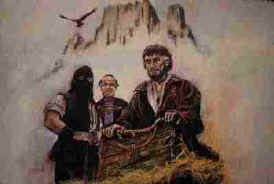
For hundreds of years, through ages of persecution, the Waldenses secretly had Bibles hidden. They read and memorized them, and secretly distributed them to those who could read throughout all of Europe. Many of the Waldenses were caught and martyred. At times, crusades were sent out to destroy all the Waldenses. But God always preserved a remnant. It was the seeds from their witness and from the Bibles they distributed that eventually helped to bring about a reformation and religious freedom.
After the embers had cooled from her friend's execution, Katrina went home, shaky but possessed with greater courage. She clutched her Bible to her breast. It was her most precious possession. To her it was worth more than life itself, for it contained the key to eternal life. "Oh thank you God that she had the courage to stand true and did not renounce her faith when caught," she said, praying about her friend. "May I be as true and brave as she was."
Katrina, like other Waldenses, spent long hours with her Bible. She did not know if she would always have it. She spent evenings by the light of the fire, with the shutters closed, memorizing large portions of its sacred messages. The stories of Jesus were her favorite sections. She committed totally to memory the gospels of Matthew and John, as well as several of the books of Paul.
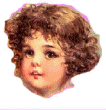 Katrina knew that she could not marry anyone unless he had
the same love for the Bible that she did. But in the providence of God, He
directed her to another Waldensian young man who shared her faith and
convictions. Soon a little girl was added to their home whom they named Amanda.
Katrina knew that she could not marry anyone unless he had
the same love for the Bible that she did. But in the providence of God, He
directed her to another Waldensian young man who shared her faith and
convictions. Soon a little girl was added to their home whom they named Amanda.
As Amanda grew, her mother carefully instilled within her the treasures of the Bible that she herself had learned from her mother's knee. Amanda's earliest recollections were of family worship, reading the stories from the Bible. At a very young age she had already memorized large portions of Scripture. She was also drilled in the importance of secrecy, and of the danger of owning such a Book. To Be Caught Was to Die! But to read it and obey it was to have eternal life. She knew of Jesus' words: "He who finds his life will lose it, and he who loses his life for My sake will find it" (Matthew 10:39).
Amanda was growing up. Then one day, so suddenly and
unexpectedly, it happened!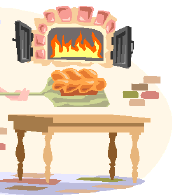 Father was gone and mother was kneading the bread
dough, getting ready to put it into pans for the oven. Mother, as usual when no
one was around, had her Bible open upon the table while kneading her bread
dough. This was a time when she often memorized. Amanda was sure if she kept
memorizing that someday she would know the whole Book by heart. It was at that
instant that Amanda heard hoof beats coming around the trail to their valley
home at the foot of the mountains. They were almost upon them before she heard
the sound. She just had time to peak out to find two soldiers jumping off their
horse in front of the door!
Father was gone and mother was kneading the bread
dough, getting ready to put it into pans for the oven. Mother, as usual when no
one was around, had her Bible open upon the table while kneading her bread
dough. This was a time when she often memorized. Amanda was sure if she kept
memorizing that someday she would know the whole Book by heart. It was at that
instant that Amanda heard hoof beats coming around the trail to their valley
home at the foot of the mountains. They were almost upon them before she heard
the sound. She just had time to peak out to find two soldiers jumping off their
horse in front of the door!
"Mother!" she screamed in a whispered yell -- for the soldiers mustn't hear, "Mother, they're soldiers!" That's all she needed to say. But she knew they were caught, for the soldiers did not wait to knock, they simply knocked the door open and walked in, looking for the Book. To be caught was to die, and Amanda knew they were caught! The Bible was right there and there was no time to hide it!
 "Where's the Book," they demanded! "You have
been reported as having a Bible. Turn it over to us now." Amanda was
shocked, surely they could see the Bible lying open right there upon the Table.
She looked at her mother, but the Bible was not there! Where was it? All she saw
was mother calmly putting the last pan of bread into the oven as though this was
an every day occurrence and she couldn't be bothered until her bread was safely
baking.
"Where's the Book," they demanded! "You have
been reported as having a Bible. Turn it over to us now." Amanda was
shocked, surely they could see the Bible lying open right there upon the Table.
She looked at her mother, but the Bible was not there! Where was it? All she saw
was mother calmly putting the last pan of bread into the oven as though this was
an every day occurrence and she couldn't be bothered until her bread was safely
baking.
Then turning around, mother simply said, "I don't know who could have reported such a thing. You won't find a Bible in this house. But you can search if you like."
"Why mother!" Amanda thought to herself, for she had been taught never to lie. Now, of course, if the soldiers could not find the Bible, her mother had not lied, but how could she be so sure they wouldn't? How could she be so calm? she wondered. How could mother have hidden it so quickly? and where? She hadn't moved from where she had been standing while kneading the bread. It was a mystery too great for her to ponder.
So the soldiers began to look. One kept a careful eye on Katrina and her daughter Amanda while the other began to ransack the house. Amanda wasn't too worried when the one started in the tiny loft -- although she cringed as they overturned her bed and few belongings, ' even poking holes in some of her things to see where it might be hidden. He searched where mother and father slept -- would they ever be able to straighten out the house again? Amanda watched with amusement as they went from corner to corner, not missing a nook or cranny. He tested all the boards of the floor and the timber of the walls to see if there might be a secret hiding place. Obviously he has done this before.
And now he came to where mother had been making her bread. Surely he would find it now! He opened the firebox to see if there were any remnants of a burnt book inside, but Amanda knew her mother would not likely have put it there, nor had she heard her lift the lid to the firebox. But Amanda was concerned, surely he would find it soon and where could she run? The one soldier continued to keep a careful eye on her and her mother. There was no escape! Where could mother have hidden it? And how could mother maintain such calmness and composure! The soldier opened the cupboards and emptied them out. He opened the oven door, but all that was there were loaves of bread baking.
"I told you that you won't find a Bible in this house," mother reminded them. Amanda was beginning to believe her. Finally, in frustration, they left. Evidently it was a false report that they had received.
Amanda held her breath until they could no longer hear the horses. Then, still whispering from fear, and beginning to shake from the stress, Amanda said: "Mother, wherever did you put the Bible? Where is it?
But her mother calmly said, "Let me take the bread out of the oven first, I was afraid it might get too done before they left."
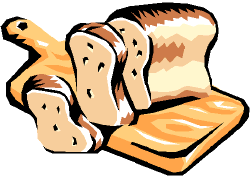
"There now, doesn't that look fine?" she said, holding up the first loaf. "Isn't it wonderful how the Lord always provides for our needs. Dear, we must thank the Lord for protecting us, for surely, if He had not sent His angel we would have been caught."
"But mother, where is the Bible? Did an angel really take it?"
"Not exactly, my dear," Katrina answered. "But an angel did tell me what to do. Come, let us kneel and thank God for His protection." So there within that humble home, their prayers ascended in grateful thanksgiving for God's merciful protection.
"Now, dear," said mother upon rising from her knees, as though she had forgotten all about the soldiers and Amanda's question, "We must let the bread cool before taking it from the pans. As you can see, they are extra done since the soldiers were here for so long. We will have some for supper when father comes. He should be here shortly." Then, as though remembering Amanda's question, she said, "You'll find out about the Bible when Father comes."
Now Amanda watched the path for Father. Upon seeing him, she ran to give him the exciting details of the day. "Wherever mother put the Bible I do not know," Amanda breathlessly said. "But surely, as the good Word says, 'The angel of the Lord encamps all around those who fear Him, and delivers them' (Psalm 34:7). He delivered us today, Father! I'm sure it was a miracle!
As Father and Amanda entered, the table was set. The rest of the house was still a wreck, but mother said they would eat first and begin to straighten up later. All Amanda and Father were interested in was where the Bible was. But the table was set, and there in the middle was a loaf of bread. It wasn't the prettiest loaf of bread, as mother had evidently not had time to smooth it out when the soldiers came. After grace, mother cut the bread. Usually Father cut it, but this time mother insisted. How carefully, almost reverently, she cut through the crust, as though this loaf of bread was the most precious thing on earth.
"Mother! There's the Bible!" Amanda screamed again in her whisper-like yell. Father leaned over wide-eyed to see the wonder also. Carefully mother pealed the bread away from the precious Word. It seemed unhurt, as though miraculously preserved. It was totally intact. And the soldiers had never found it.
"So that is what happened to the Bible!" exclaimed Amanda in wonder. "You wrapped it in the bread dough and stuck it in the oven. Surely, if you had not been studying the Bible while making your bread, you could not have hidden it and the soldiers would have found it."
"That is right," said mother. "When the soldiers came, I didn't have time to even think. But it was as if an Angel spoke to me and my hands immediately complied. I wrapped the Bible in the bread dough and put it in the last loaf of bread and put it into the oven. I would never have been able to think of it so quickly. Surely the Lord has protected us."
Dear friend, you don't have to give your life to own a Bible. Millions of Waldenses and others gave their life for this Word. And yet, it is still just as important for us as for them. It still holds the key to eternal life.
Give Me the Bible
-
Give me the Bible, star of gladness gleaming,
-
To cheer the wanderer lone and tempest tossed,
-
No storm can hide that peaceful radiance beaming,
-
Since Jesus came to seek and save the lost.
-
-
Give me the Bible - holy message shining,
-
Thy light shall guide me in the narrow way.
-
Precept and promise, law and love combining,
-
Till night shall vanish in eternal day.
-
-
Give me the Bible when my heart is broken,
-
When sin and grief have filled my soul with fear;
-
Give me the precious words by Jesus spoken,
-
Hold up faith's lamp to show my Savior near.
-
-
Give me the Bible, all my steps enlighten,
-
Teach me the danger of these realms below;
-
That lamp of safety, o'er the gloom shall brighten,
-
That light alone the path of peace can show.
